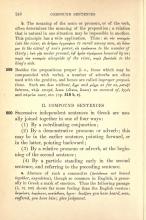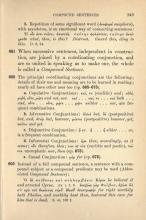600. Successive independent sentences in Greek are usually joined together in one of four ways
1. By a coordinating conjunction;
2. By a demonstrative pronoun or adverb; this may be in the earlier sentence, pointing forward, or in the latter, pointing backward;
3. By a relative pronoun or adverb, at the beginning of the second sentence;
4. By a particle standing early in the second sentence, and referring to the preceding sentence.
a. Absence of such a connective (ἀσύνδετον not bound together, asyndeton), though so common in English, is generally in Greek a mark of emotion. Thus the following passage shows far more feeling than the English version.
ἀκηκόατε, ἑωρκατε, πεπόνθατε, ἔχετε· δικάζετε.
You have heard, seen, suffered, you have him; give judgment.
Lysias 12.100
b. Repetition of some significant word (
Tί οὖν ἐστι τοῦτο; ἀπιστίᾱ. ταύτην φυλάττετε, ταύτης ἀντέχεσθε.
What, then, is this? Distrust. Guard this, cling to this.
Demosthenes 6.24
601. When successive sentences, independent in construction, are joined by a coordinating conjunction, and are so united in speaking as to make one, the whole is called a Compound Sentence.
602. The principal coordinating conjunctions are the following; details of their use and meaning are to be learned in reading; nearly all have other uses too (cp. §§ 665 – 673).
a. Copulative Conjunctions: καί, τε (enclitic) and; οὐδέ, μηδέ, οὔτε, μήτε and not, nor. καί . . . καί, τε . . . καί (both . . . and), οὔτε . . . οὔτε, μήτε . . . μήτε (neither . . . nor) are frequent combinations.
b. Adversative Conjunctions: ἀλλά (but), δέ (postpositive, but), and ἀτάρ (but, however), μέντοι (postpositive, however, yet), καίτοι (and yet).
c. Disjunctive Conjunction: ἤ or ἤ . . . ἤ (either . . . or) is a frequent combination.
d. Inferential Conjunctions: ἄρα (then, accordingly, as it seems), οὖν (therefore, then) νυν or νῡν (enclitic and poetic), τοίνυν (unemphatic now, then; cp. § 673).
e. Causal Conjunction: γάρ (for; cp. §. 672).
603. Instead of a full compound sentence, a sentence with a compound subject or a compound predicate may be used (Abbreviated Compound Sentence).
Ὁ δὲ πείθεται καὶ συλλαμβάνει Κῦρον.
He believed it and arrested Cyrus.
Xen. Anabasis 1.1.3
ἐπαξίως γὰρ Φοῖβος, ἀξίως δὲ σὺ πρὸ τοῦ θανόντος τήνδʼ ἔθεσθʼ ἐπιστροφήν.
For right worthily hath Phoibos, and worthily hast thou, bestowed this care for him that is dead.
Soph. Oedipus the King 133–134


